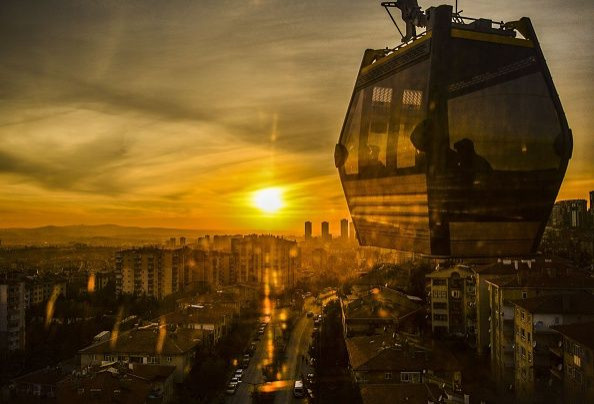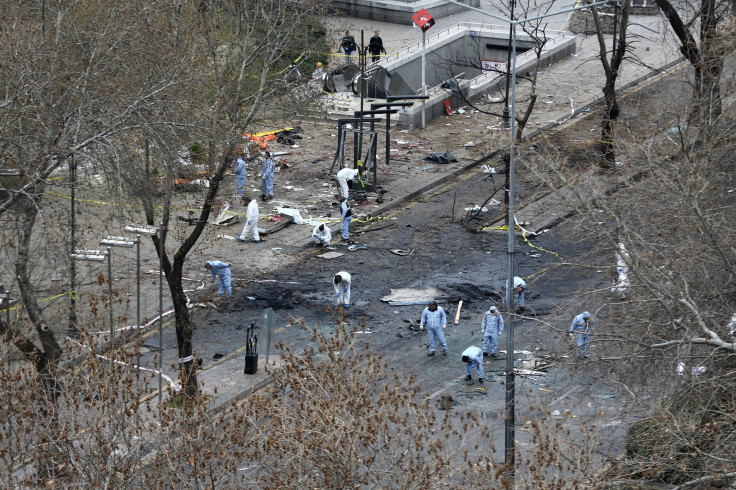After Ankara Bombing, Fears Loom Over Turkey’s Economic Future, Long-Term Foreign Investments

Investors have been watching Turkey closely after Sunday’s deadly Ankara bombing brought into question their long-term prospects in the country. The third major attack in Turkey’s capital in just five months, which left at least 37 people dead, exacerbated growing instability and further compounded efforts to resuscitate the phenomenal economic growth the country flaunted less than a decade ago.
“That era is completely over now,” said Sebnem Kalemli-Ozcan, a professor of economics at the University of Maryland in College Park who focuses on Turkey and other emerging markets. “Political stability is one of the first things [investors] look at. They are going to bring their family, their know-how; they are going to live there for a couple years. Why would anyone do that if there are bombs in the capital city?”
Parallel to spiraling violence, Turkey has struggled with slowing growth, increased fiscal expenditures, growing unemployment and a loss of export competitiveness. At the same time, a conflict is raging in the southeast, where a tenuous ceasefire with Kurdish militants has unraveled over the past year, and attacks have struck the heart of Ankara and Istanbul.
Tourism has dropped, and textile and produce exports have been hurt, as Russia has slapped limited sanctions against Turkey following the downing of a Russian fighter jet over its border last year. And the current government — once hailed as a model Muslim democracy — has recently been accused of growing increasingly authoritarian and excessively corrupt.
“These security and stability factors are playing an important role,” Kalemli-Ozcan said. “If you were an investor, what would you do? You look at your portfolio … and you’re going to see Turkey is one of the weakest links.”
“We are talking about a country with no laws,” she said.
Financial and insurance services, manufacturing and industrial sectors have the highest amount of foreign direct investment in Turkey. The country saw a major dip amid the financial crisis in 2009 and 2010, and never completely recovered. Turkey had about $12.5 billion in investments as of 2014, the most recent statistic available.

In the mid-2000s, Turkey’s economy was booming. The newly elected moderate-Islamist AK Party ushered in economic reforms that saw an average of 8 percent growth per year. In a wider region that was witnessing an economic slump, Turkey paved its reputation as a major power among its Middle Eastern neighbors. Everything from Turkish soap operas to halal gummy candies spread across the Middle East. President Recep Tayyip Erdoğan, then prime minister, was hailed among many Muslims worldwide as a leader who had turned his country from an aid recipient to a major economic force.
But the economic plan was doomed from the start, according to Erinç Yeldan, dean of the economics department at Bilkent University in Ankara. Turkey had long sought membership in the European Union, but under Erdoğan's leadership, political and business leaders increasingly placed their chips with the Middle East. It was a dangerous move, Yeldan said, as Turkey was damaged when instability rocked several countries in 2011. Global economic trends — including dampening economic prospects in Europe and China — haven’t helped, either.
“Turkey is facing those external constraints as well as its own domestic mishaps,” Yeldan said. “With the expansion in the Turkish economy [in the 2000s] and its political strength, Erdoğan got into this fantasy of becoming the leader of the region … this adventurous involvement in political chaos, with expectations of earning recognition in the region, was completely shattering and disadvantageous.”
Recent violence, he said, has worked only to intensify the downturn.
“The fact that foreign direct investment money, that influx has been curtailed, that now has more severe repercussions… that is where the most devastating impact is felt,” he said.
Despite its economic troubles, Turkey is still pushing highly ambitious infrastructure projects. Plans are moving forward for the world's largest international airport. Set to be built on an 828 million-square-foot plot of land on Istanbul’s European side, the airport is planned to serve some 150 million passengers per year, which would make it the busiest airport in the world. The nearly $9 billion project would add to two extant airports in Turkey.
There are also plans to expand a high-speed, state-of-the-art rail network, build a third bridge over the Bosporus that cuts through Istanbul and create a waterway that critics are calling the "crazy canal.”
Khush Choksy, senior vice president of the Middle East and Turkey Affairs at the U.S. Chamber of Commerce, which advocates for international trade relations, said these projects reflected continued potential in the country. Countering speculation that investors might soon, or were already beginning to, withdraw from Turkey, he said U.S. businesses were encouraged by Turkey’s overall economic prospects.
“Long-term investors will stay the course, as Turkey has proven to be a resilient economy and business environment,” Choksy told International Business Times in an email interview. “U.S. businesses are encouraged by Turkey’s overall economic growth, and they are committed to the short-, medium- and long-term economic stability of Turkey. The U.S. Chamber of Commerce has recently seen a higher level of interest in Turkey by U.S. companies this year than in the recent past.”
Others interpret the optimistic megaprojects, which have become part and parcel with Erdoğan's presidency, differently. They show that the government is out of touch with regular people's concerns, several economics and politics analysts said. Some of the plans have had trouble finding international investors, according to Gareth Jenkins, an Istanbul-based expert for the Silk Road Studies Program, a Central Asia research center.
“The more things fall apart, the more Erdoğan thinks they’re coming together,” Jenkins said. “It’s one of the most disturbing aspects of what’s going on.”
He said that while some investors seemed to be avoiding major, large-scale investments, many were choosing to remain in the country for now.
“When you’ve got this very clear lack of rule of law now, it makes a lot of businesses really uncertain,” Jenkins said. “They’re holding on, holding on; if there is a trigger, they’re likely to get a big hit.”
“It could be like bursting a bubble,” he said. "We can’t keep having these bombings."
© Copyright IBTimes 2024. All rights reserved.





















